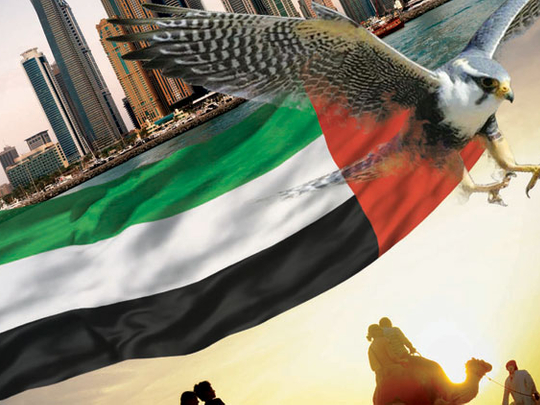
This is not another attempt to define Emirati national identity, but a brief commentary of what shapes Emirati representations in the public sphere. The issue of Emirati national identity is loaded with semantics, nuances and interpretations.
With the UAE celebrating its 41st anniversary tomorrow, the debate about what defines, forms and shapes Emirati national identity will be once again at the forefront of public and state discussions. Depending on the Emiratis one speaks to one gets different answers on identity. There are, however, some overarching themes that have become part of the national narrative.
For one, many Emiratis seem to relish the opportunities and choices provided to them by the state. They can determine their own lifestyle based on either drawing on the diverse subcultures or withdrawing into their own enclaves of the like-minded. They are offered amenities that involve trade-offs and compromises that need to be hashed out in their daily lives, but these are unique opportunities not available in many other countries. Openness and tolerance allow for productive interactions between Emiratis and the many foreign nationals residing in the UAE. The interaction has pushed Emiratis to see themselves as valued and contributing members of society, constantly striving to work for the well-being of the country and very often exhibiting a sense of moral and ethical responsibility towards the state and its government. This is surely a good thing.
Another sentiment that often becomes apparent in discussions about the county’s history and its present is a nostalgic longing for the past, while simultaneously exhibiting a sense of pride in the achievements and accomplishments that have come with the socioeconomic developments of the country. This speaks to the traversing of both modernity and tradition, a coexistence and compatibility between one and the other.
Particular images and symbols, such as camels, horses, falcons, dhows and coffee pots suggest a notion of a romanticised past, while juxtaposed with high-rise buildings, high-tech universities, Starbucks and other western franchises and award-winning airlines.
The notion of national identity is intrinsically linked to the late Shaikh Zayed Bin Sultan Al Nahyan, the charismatic founding-father and driving force behind the formation of the UAE. He personifies much of what many Emiratis uphold or strive for. His virtues and persona have become the benchmark and ideal for what it means to be an upstanding citizen of the UAE. The enduring legacy and leadership of Shaikh Zayed are deeply embedded in the cultural historiography of the country.
Last but not the least, Emirati women have largely become the public face of progress in the UAE. They are symbolic representations of an advancing society and a marker of all that is modern while also resting on the foundations of a still traditional society. Female empowerment or the projection thereof is another example of the compatibility of modernity and tradition. Fuelled by an emphasis on education, women are seen as agents of change as well as bearers of continuity.
Where does identity construction come from? Besides the family that is the main transmitter of cultural heritage, the state is attributed with efforts of institutionalising and at times engineering the notion of national identity. State agencies, through the mediums of ADACH (Abu Dhabi Authority for Culture and Heritage), schools and Cultural Heritage Festivals have embarked on nation-building programmes with the aim of socialising the youth into understanding the particularities of cultural preservation. There is a conscious state policy that is focused on keeping traditional ways alive, despite ever-encroaching globalisation and technological changes. Campaigns such as ‘I am Emirati’ highlight the similarities amongst the various emirates and play to patriotic sentiments at the federal level. National loyalty is expressed through common bonds in degrees of separation.
The expressions and manifestations of Emirati national identity are manifold, often complex, ambiguous and steeped in the past, present and future. While globalisation and the demographic imbalance in the UAE render certain challenges, there is also a sense of consistency that infuses the understanding of national identity in the UAE.
Kristian Alexander is assistant professor in humanities and social sciences, Zayed University, Abu Dhabi.








